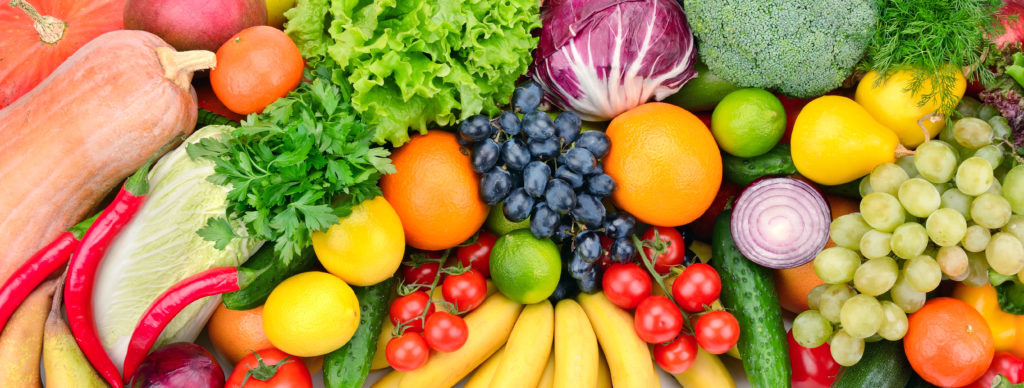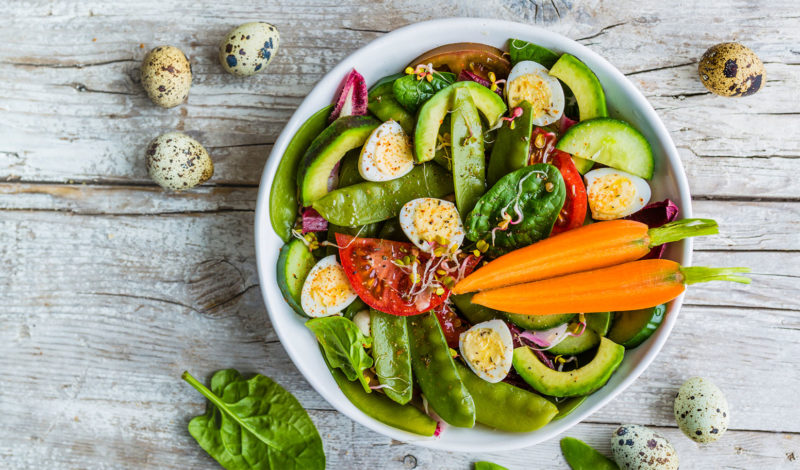With a healthy and varied diet vegetarians usually have no nutrient deficiencies to fear. Vegetarians should pay attention to nutrients [...]

Vegetarians: Is it healthy to avoid meat?
If you know what is important for your diet, you’re definitely doing something good for yourself.
Is being a vegetarian healthy? More and more people are asking themselves this exact question. The answer is: Yes and no. The image of bland plant food lovers is a cliché. However, there are also so-called “pudding vegetarians.” These vegetarians do not eat meat but are not healthy because they prefer sugary soft drinks and fatty chips. We have taken a close look at the health benefits of avoiding meat and the factors that still play a role in vegetarian nutrition.
Vegetarians and health benefits
“Meat makes me big and strong.” This is an old saying from a grandmother’s time when Sunday roasts were something special. Since then, more critical voices have come forward and many consumers have been talking about the advantages of vegetarian food.
Animal fats vs. Vegetable fats
Concerns often arise about the high fat content of meat. Due to their high energy value, fats are generally extremely high in calories and those who eat a lot of meat build up the amount of his or her stored fats. Although the body needs fat, the quality of the fat should also be taken into account.
Animal fats usually contain many saturated fatty acids. An exception are fatty fish such as salmon or herring. Saturated fats increase the negative LDL cholesterol in the blood. Therefore, a lot of meat cannot only make you fat, but can also lead to unhealthy cholesterol levels. For this reason, eating meat makes you susceptible to cardiovascular diseases..
Vegetarians who avoid fatteners such as French fries, chips, and puff pastries and use olive oil or nuts in moderation generally eat less fatty foods as a result. For this reason, the vegetarian diet helps reduce the risk of heart attacks, strokes, and high blood pressure.
Exceptions to a vegetarian diet being healthy include fried and baked foods that contain so-called trans fats which are very unhealthy. The same applies to hardened vegetable oils such as those found in margarine. Vegetarian foods are therefore not healthier at all times. It always depends on the correct selection and quantity. However, compared to someone who eats a lot of meat (more than 600 grams per week), vegetarians clearly have health advantages.
Vegetable nutrients
Vegans eat a particularly strict vegetarian diet. But even vegetarians who do not forego milk products and eggs usually eat more vegetables and fruits as well as whole-grain bread, oat muesli, and lentils, than meat eaters. These pure vegetable products are rich in important nutrients and trace elements. Those who consume all these foods regularly consume a lot of Vitamin C, E, B1, beta-carotene, and folic acid. Vegetables are rich with magnesium, manganese, and potassium. Additionally, vegetables provide high-fibre content. This stimulates digestion and supplies useful intestinal bacteria with plenty of nutrients. Furthermore, dietary fibres increase blood sugar levels more slowly after eating, which reduces the risk of diabetes. With a balanced vegetable diet, vegetarians get several healthy secondary plant nutrients. These influence the human metabolism and have an anti-inflammatory effect. Moreover, they are believed to protect against cancer, arteriosclerosis, and high blood pressure. In addition, vegetables provide for high-fibre meals. This stimulates digestion and supplies useful intestinal bacteria with plenty of food. Furthermore, dietary fibres increase the blood sugar level more slowly after eating, which reduces the risk of diabetes. With a balanced vegetable nutrition vegetarian take also many healthy secondary plant materials . These influence the human metabolism and have an anti-inflammatory effect. Moreover, they are believed to protect against cancer, arteriosclerosis and high blood pressure.

Proteins
Meat is a significant protein source. Since proteins are the basic building blocks of our body, they are simply indispensable. Legumes, cereals, and nuts are also packed with protein. Compared to the animal proteins, vegetable proteins have two advantages. First, the body can more easily utilise them and convert them into body protein. Second, you avoid unhealthy additives with this protein source. After all, every gram of animal protein contains a lot of saturated fats, cholesterol, salt and, more often than not, antibiotics and hormones. You should also know that not every meat product is rich in protein. Highly processed products such as sausage or ham have low protein levels. According to the World Health Organization (WHO), red and industrially produced meat is suspected of promoting cancer.
Milk products and eggs
Most vegetarians eat yoghurt, quark, cheese, and drink milk. Compared to a strictly vegan diet,vegetarians usually get a sufficient amount of calcium. The European EPIC (European Prospective Investigation into Cancer and Nutrition) study also found that milk consumption reduces the risk of diabetes.
Milk products also help you get your needed amount of protein. Although this comes from animals and contains saturated fatty acids and cholesterol, lacto-vegetarians appear to have a health advantage. According to some studies, milk products have a positive effect on the cardiovascular system. Two small biochemical details constitute a key difference from meat. Milk fat mainly increases the “good” HDL cholesterol and also has less of the aggressive LDL cholesterol molecule. This especially applies to bio milk because cows who produce this milk feed on grasses.
Fermentation of milk products also seems to have positive effects. Yoghurt, kefir, buttermilk, and cheese have a beneficial effect on cholesterol levels. Another advantage of lactic fermented foods are the bacteria which enrich the intestinal flora. The microbial balance of the intestines are important for our health. With our intestinal test INTEST.pro, you can find out how your intestinal flora functions.
Is vegetarian food really healthier?
The extensive EPIC-Oxford Study, which has been running since 1993, has established that vegetarians eat more healthy food than meat eaters. It has been observed that a vegetarian diet has the potential to prevent heart disease and cancer. However, the statement “Vegetarians live healthier” is not necessarily true.
One steak per month does not increase the risk of a heart attack suddenly. Rather, the continual, high consumption of meat increases this risk. Just as damaging is a meatless diet that involves the consumption of many sweets, chips, and baked goods.
Milk is not a panacea either and spinach alone is not enough to make anyone full and strong. The latter, by the way, contains far less iron than generally assumed. A healthy diet depends on a complete food plan which combines different kinds of food and nutrients. Vegetarianism is only beneficial if you prevent nutrient deficiencies. Vegans should pay special attention to nutrients like iron, vitamin B12, calcium, zinc, and iodine as well as take several essential amino acids.
However, nutrition is only one factor. Our lifestyle also determines whether we stay healthy and live longer. In addition to the advantages of avoiding meat, many studies have uncovered another interesting correlation between vegetarianism and overall health. These studies have shown that most vegetarians do not only attach importance to healthy food, but smoke less often, drink less alcohol, and exercise more than the average population. However, the extent to which vegetarian food contributes to these correlated actions should not be seen as absolute.



